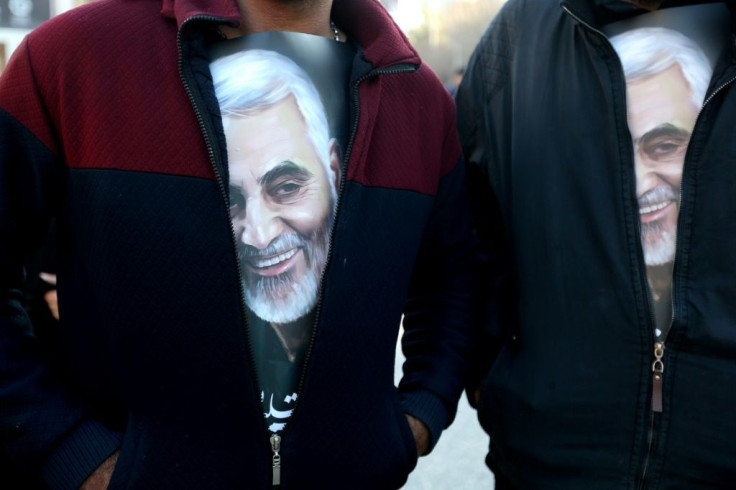Wednesday's Stock Market Open: US Equities Moderately Lower After Iran Missiles Attacked U.S. Forces In Iraq

KEY POINTS
- Private sector jobs increased by 202,000 in December
- Crude oil futures spiked overnight but have since eased
- Iran's foreign minister Zarif said missile attack was purely for self-defense
U.S. stocks rose Wednesday, with the S&P 500 reaching an all-time high, as President Donald Trump calmed investors fears by speaking at the White house on the morning after Iran fired ballistic missiles at two military bases near Baghdad housing American forces. Oil prices plunged.
The Dow Jones Industrial Average rose 187.93 points to 28,771.61 while the S&P 500 gained 20.42 points to 3,257.60 and the Nasdaq Composite Index climbed 59.58 points to 9128.16.
Crude oil futures plunged 4.37% at $59.96 per barrel and Brent crude fell 2.62% at $65.65. Gold futures rose 1.12%.
Trump said Wednesday that Iran “appears to be standing down” after its missile launches, but assured that the U.S. will “immediately impose additional punishing economic sanctions on the Iranian regime.”
Trump also said there were no American or Iraqi casualties from the missile attack and that damage to the bases were minimal.
“As long as I am president of the United States, Iran will never be allowed to have a nuclear weapon,” Trump added.
Iran fired ballistic missiles at two air bases in Iraq – in Al Asad and in Irbil -- housing U.S. troops in retaliation for the killing of Gen. Qassem Soleimani.
Trump quipped that Soleimani should have been "terminated" long ago.
Iran's Supreme Leader Ayatollah Khamenei called the attack a "a slap in the face" for the U.S. Iranian Foreign Minister Mohammad Javad Zarif said the attack was an act of self-defense and not the prelude to war. “We do not seek escalation or war, but will defend ourselves against any aggression,” Zarif tweeted.
Some analysts contend the impact of the crisis has been minimized in the markets.
“After the panic 50 [point] decline last night in the S&P futures, I believe the markets response this morning is rational in the belief that these missile launches are likely the end of this spat rather than a further escalation,” wrote Peter Boockvar, chief investment officer at Bleakley Advisory Group.
“While tensions between the U.S. and Iran are likely to continue, our base case does not assume significant and serious escalation as both sides do not have an interest to pursue a broader military conflict,” wrote Mark Haefele, global chief investment officer at UBS Wealth Management, overnight.
In addition, it appeared that timing of the missile attacks were designed to cause minimal damage.
“An attack by a large handful of ballistic missiles is a show of force and an expression of Iranian military strength, but also signals their weakness,” Thomas Karako, director of the Missile Defense Project at the Center for Strategic and International Studies, told CNBC. “Their growing and diversified missile arsenal poses a real threat, but the overall military balance is certainly not in their favor.”
Iran state TV reported that a Boeing 737-800 plane belonging to Ukraine International Airlines crashed soon after taking off from Tehran's Imam Khomeini airport, killing all 176 people onboard.
In economic data, total mortgage application volume fell by 1.5% for the last two weeks of 2019, the Mortgage Bankers Association said.
“Mortgage rates dropped last week as investors sought safety in U.S. Treasury securities as a result of the events in the Middle East, with the 30-year fixed mortgage rate declining to its lowest level since early October,” said Mike Fratantoni, the association’s chief economist.
Private sector employment increased by 202,000, well above expectations, in December, said the ADP National Employment Report.
Overnight in Asia, markets closed broadly lower higher. China’s Shanghai Composite dropped 1.22%, while Hong Kong’s Hang Seng fell 0.83%, and Japan’s Nikkei-225 plunged 1.57%.
In Europe markets finished higher, with Britain’s FTSE-100 edging up 0.01%, France’s CAC-40 rose 0.31% and Germany’s DAX gained 0.71%.
The euro dropped 0.32% at $1.1117 while the pound sterling slipped 0.13% at $1.3104.
© Copyright IBTimes 2025. All rights reserved.





















